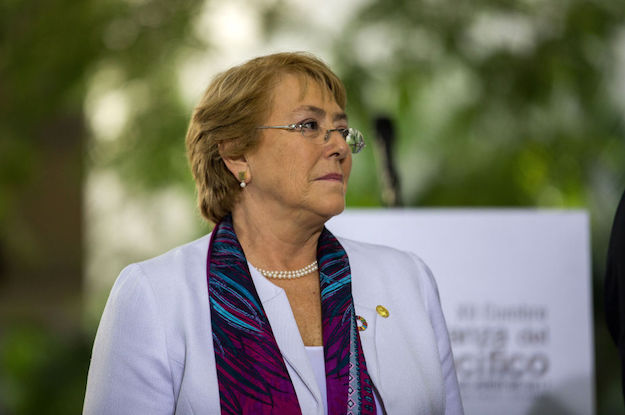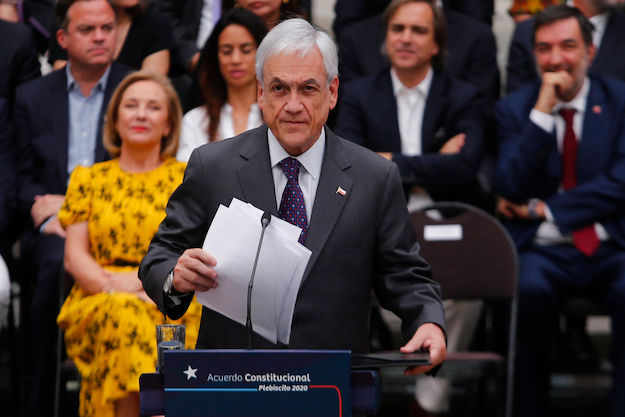To live by approval ratings is to die by them. No Latin American head of state has seen this as clearly as Chile’s Michelle Bachelet, who leaves office March 11 after her second (non-consecutive) term in office.
When Bachelet left office the first time, in 2010, her approval ratings soared above 80 percent. That popularity helped carry her back into office in 2014, winning by the largest margin in Chile’s post-dictatorship history. But in the time since, corruption scandals, an economy dragged down by low copper prices and unmet expectations quickly weighed on her poll numbers, which at times dropped below 20 percent. Her cabinet was often dysfunctional, and many of her most ambitious ideas – such as a new constitution and badly needed pension reform – never got off the ground. Voters’ overall impression was of messy politics hobbled by squabbling and poor governance. She has since bounced back a small amount, and limps out of office with the support of approximately four in 10 Chileans.
This arc has created a common narrative that her second term represented disappointment, if not failure. To The Economist, it has been “frustrating.” The Chicago Tribune described the electorate as “disillusioned” with politics. U.S. News & World Report called hers a “mixed legacy.” Certainly Chilean voters report negative sentiments – a February poll found that 57 percent feel she leaves the country no better off than she found it in 2014.
But there are reasons to think that Bachelet deserves more credit than given by voters and analysts, and that her legacy will be more enduring than her poll numbers would suggest.
She entered her second term with promises to reduce income disparity and reform the education system after a series of student-led protests pressured the government to take action. Although expectations were, in retrospect, probably impossible to meet, her efforts still yielded real results. As part of a fundamental reform of the country’s voucher-heavy education system, she banned for-profit institutions in primary and secondary schools. At the university level, her reforms did not live up to the promise of “free university for all,” but they did deliver it for the bottom 60 percent of households. True, there are many ongoing faults and criticisms. Universities, for example, are worried about declining educational quality and some experts argue that a major investment would have been better spent on early childhood education rather than university. Still, the progress in responding to the demands of the student protests is hard to ignore.
In part to pay for this expansion of public education, and in part to address the second-highest inequality rate in the OECD, Bachelet also pushed through a comprehensive tax reform package. Above all, the reform made the tax code more progressive, raising taxes on corporations and top earners. The top 1 percent, for example, saw their average taxes rise by almost 50 percent according to the World Bank. The reform also removed opportunities for tax evasion and implemented new excise taxes on tobacco, alcohol and sugary drinks, and “green taxes” on carbon and motor vehicles – part of the reason Chile is now a regional leader in renewable energy, with half of Latin America’s installed solar capacity.
To be sure, one of the most enduring criticisms of the Bachelet government is that the tax reform killed investment and slowed the economy. Economic growth averaged less than 2 percent a year through the course of her second term, compared to over 5 percent under her predecessor. But while critics blame the complexity of the new tax rules, external factors such as the fall in copper prices may be more responsible. Indeed, neighboring economies such as Brazil and Argentina have fared even worse over the same period, and Peru and Colombia performed only marginally better. And now that copper prices are rising, the economy is accelerating again. Moreover, regardless if one agrees with Bachelet’s progressive politics, the tax reform – together with labor reforms that strengthened union rights and collective bargaining – arguably represents a seismic shift in Chile’s approach to inequality.
Bachelet – who is the only remaining female president in the Americas – also leaves behind a legacy as a regional leader who shifted the conversation and moved the national consensus on gender and identity. In 2016, the administration created a Ministry of Women and Gender Equality to address issues of gender disparities and discrimination. After decades of antiquated restrictions, she spearheaded a landmark decision to decriminalize abortion under three circumstances against powerful opposition from the church and right-wing parties. Bachelet was also an advocate for same-sex couples, passed a law allowing civil unions, and proposed a marriage equality bill.
All told, Bachelet’s second government was arguably the most impactful – in a purely ideological sense, for good or ill – of any in Chile’s post-dictatorship history.
But her real legacy may be apolitical.
First, the 2015 electoral reform, although often not recognized as part of her reform agenda, effectively remade how Chile’s congress is elected, moving from the Pinochet-era binomial system (where each district elected the top two vote-getters, effectively guaranteeing two-party dominance) to a more proportional and representative system. Most importantly, the reform dramatically lowers the barriers to entry for small parties. This will hopefully have a transformative impact on politics, making elections more responsive and dynamic. Eventually, the new system may also help stem the sense of discontent with what Bachelet called the “permanent draw” between center-left and center-right, which had resulted in of declining party affiliation and rising abstention.
And most importantly of all, the buck stopped with Bachelet when it came to the biggest crises of her second term: corruption.
When confronted with a wave of destabilizing conflict of interest scandals implicating actors on all sides of the political spectrum, including her own son, she tackled the problem with a systematic, sober and (critically) bipartisan presidential commission headed by economist Eduardo Engel to propose ethics and campaign finance reforms. To date, 63 percent of the commission’s slate of 236 recommendations has been enacted. Bachelet could have responded to the scandals with a political dogfight. Instead, she pursued a consensus response. In doing so, Bachelet arguably ended up taking most of the public blame for corruption – but was also able to guarantee meaningful progress against structural corruption. According to a poll in 2016, 60 percent of Chileans believe that these measures could restore trust in politics. With any luck, the commission and its reforms are likely to become an example for other countries in Latin America.
When she exits La Moneda for the second and almost certainly last time on Sunday, Michelle Bachelet will leave a legacy that is in the end defined by how one keeps score. Relative to expectations, her tenure has surely been disappointing. In terms of longevity, the jury is still out – her successor Sebastián Piñera has pledged to leave some of her reforms in place, but just how much he changes is uncertain.
But in absolute terms? The sheer scale of her impact over four years is important to recognize.
More than anything, her disappointments are perhaps a product of her own lofty ambitions. Maybe that alone is a positive reflection on her legacy. To focus on the parts of Bachelet’s agenda that were not realized, instead of the many successes, would be to punish boldness, creativity and a reformist approach to politics. In a moment of widespread political and institutional stagnation, that’s the last thing that Chile – and Latin America – needs.
—
Seiler is the development and external relations coordinator at the Inter-American Dialogue. Raderstorf is a program associate in the Dialogue’s Peter D. Bell Program.






